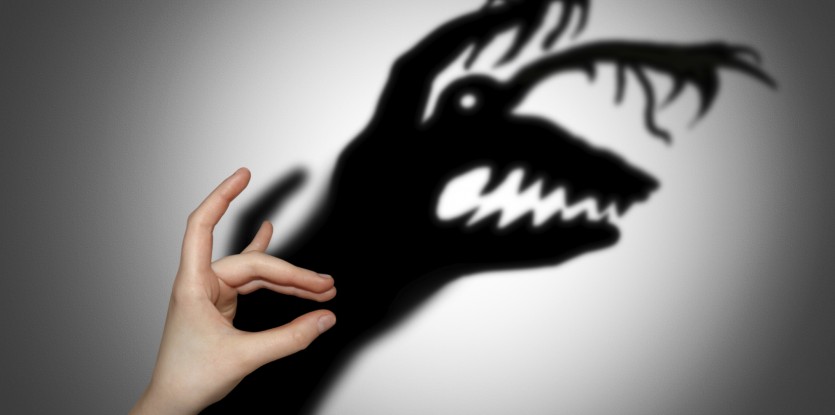What Are We Afraid Of?
And G-d said to Moses: “Come to Pharaoh…” – Exodus 10:1
Said Rabbi Shimeon: Now it is time to reveal secrets that are bound above and below. Why does it say, “Come to Pharaoh”? It should have said, “Go to Pharaoh” …. But G-d brought Moses into a chamber within a chamber, to the… supernal and mighty serpent from which many levels evolve…which Moses feared to approach himself because he saw that he was rooted in supernal roots…
Zohar, part II, 34a
Fear is perhaps our greatest enemy. Not because it is loud and aggressive, but because it is invisible. Is there a person alive that does not suffer from some fear, known or (even worse) unknown? And what effects do our fears have on our lives – what impact does it have on our choices and ambitions, on our behavior, pride, jealousy, anger and so many other emotions? Can it even be measured?
Is our drive for success a way to mask or compensate for some of our fears? What critical mass effect does fear have on society?
Above all, what are we exactly afraid of and what is the root of fear? Without getting to the core of our fears we can hardly expect to alleviate them.
Though our fears today have obvious roots (fear of attack, fear of death), yet we see that there are individuals – as has always been the case in history – that do not get paralyzed by fear and have the ability to grow through it. What is their secret?
This week’s Torah portion, parshat Bo, teaches us the secret to both the root of fear and to its antidote.
The chapter opens with the following words: And G-d said to Moses: “Come to Pharaoh…” The Zohar [classical mystical text] asks the question: Why does it say, “Come to Pharaoh”? It should have said, “Go to Pharaoh” … But G-d brought Moses into a chamber within a chamber, to the… supernal and mighty serpent from which many levels evolve…which Moses feared to approach himself because he saw that he was rooted in supernal roots…”
Moses had already visited Pharaoh many times before this commandment, “Come to Pharaoh.” What suddenly frightened Moses this time around? And how did G-d’s response “Come to Pharaoh” assuage his fear?
Up till this point Moses dealt with Pharaoh in his various manifestations, not his essence. But now he is told to enter into the core essence of Pharaoh’s evil, the ‘great serpent.’ This terrified Moses. To which G-d responds: “Come to Pharaoh,” Come with me. G-d is saying that you don’t go alone. I come with you and help you eradicate the evil at its source.
And here we see the true nature of fear.
Fear’s true power is in the loneliness that it imposes upon us. We feel we are alone in our predicament. We feel that no one can understand our pain and suffering. And even if someone can empathize, we still feel that they are not with us, not one with us and therefore ultimately we remain isolated.
Life inherently has a built in existential insecurity. Upon birth, the Talmud tells us, we are made to forget the teachings ingrained into our very psyches and souls. Existence, the mystics teach us, is an effect of a cosmic detachment. As a result of the ‘great tzimtzum’ we feel all alone; we feel we are on our own – isolated in a desolate universe, disconnected from any source of sustenance.
This existential loneliness is the root of fear. And this is what Moses – even the great Moses – was so terrified of as he prepared to confront the core evil of Pharaoh, the ‘supernal serpent.’ He was afraid and felt that he was going alone.
Obviously, Moses’ fear is relative to him and to the unprecedented challenge he was facing: Encountering and purging the root essence of evil. Fear is relative to each person and his/her situation, the difficulties each of us faces and the strengths each of us has. What frightens one person may not even stir another. Yet, the common denominator between all of us is – and this is the relevant lesson we derive from Moses – that fear (on the level relative to us) results from our sense of isolation.
And therefore G-d’s response to Moses’ terror is, “Come with Me,” I go with you.
This is the powerful message that each of us must take from parshat Bo – “Come with Me.” No matter how lonely we may feel, especially in our loss and pain, we are not alone.
The only answer to the invisible power of fear – the fear of being alone – is to recognize that you are not alone.
You are never alone.








Good to hear but what practically do you do with that knowledge?
I don’t agree that Moses feared the Pharaoh in last week Parasha chapter 7 vers 1 g-d very clearly states that the phero will listen to him . Note further that Moses later on in Parashat Hazinu chalanges us in the future not to fear the terrorists.see chapter 32 vers (how is it possible that one will chase a thousand and two will scare off 10 thousand ).
And continue to describe the terorists and their seporters ?
Staying tuned, and connected with the endless Light, should make us only fear one thing, and that is, losing that connection. While we are connected, we can overcome any challenge in our path.
That was so inspiring to me!!!!!